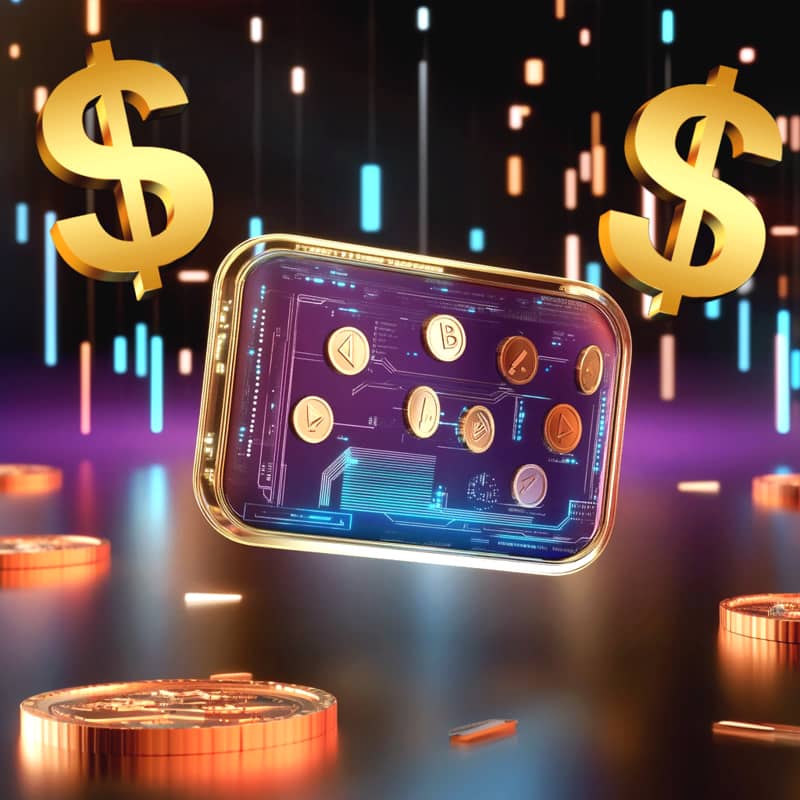Have you just started to dabble with cryptocurrencies or are you perhaps considering about getting into the crypto marketplace? You can gain some crypto knowledge in this guide as we will talk about the essentials of crypto wallets. What are they, what do they do, is it necessary to use one, etc…
What about do you remember the last time you paid for something with cash? I am guessing you probably cannot remember because most consumers now transact with digital money. In addition to the contactless credit and debit cards issued by banks, digital wallets have also become an equally essential tool for modern digital life. Thus, we will also explore its many uses in this post.
First of all, you must understand that not all so called e-wallets are the same. Digital wallets and crypto wallets both serve distinct purposes and they differ in many aspects and functions. So, let’s gain some understanding of their differences which will help you maximize their potential.
What Are Digital Wallets?
Digital wallets are software applications that store payment information, such as credit card details or bank account numbers. Popular examples include PayPal, Apple Pay, Google Wallet, and Venmo. You can use these digital wallets to make online purchases, send money, and pay for goods and services in physical stores with just a smartphone or smartwatch.
Practical Uses of Digital Wallets
- Online Payments:
Digital wallets simplify the checkout process by securely storing payment details. With such a wallet in your hand, you do not have to store credit or debit card details with your favorite shopping websites. This helps to improve data privacy as your personal details are not scattered across multiple websites. - Contactless Payments:
You can use NFC-enabled devices to pay for merchandise in stores without carrying cash or cards. With Near Field Communication (NFC), you can securely exchange digital data over short distances, typically within a few centimeters. NFC can transfer other types of digital data apart from payment details. You can also use the technology to pair Bluetooth devices, pass contact details to a nearby person, and it can even unlock smart locks. - Peer-to-Peer Transfers:
With digital wallets, you can send or receive money instantly. For example, you can use your digital wallet to split the bill with a friend at the restaurant or receive money from a customer who is buying something from you. You can of course use NFC to perform this task if your device supports the technology. - Finance Management:
Digital wallets usually allow the user to track recurring payments for streaming activities or bill payments. This convenience enables the user to easily manage their finances in one app. To enhance the security of your digital wallet, you can authorize only specific transactions to go through. For example, you can block peer-to-peer transactions if you don’t use it frequently, but automatically authorize payments that go to your bills and favorite merchants. - Lifestyle On-The-Go:
If you are looking around for a digital wallet, you might want to look for one that rewards you with loyalty points and other perks. You can then redeem your points for free merchandise or food and beverage vouchers. One of the distinct advantages with digital wallets is its seamless integration with merchants, and this provides a new avenue for digital marketers to capitalize on.
Tech Tip: Protect your online privacy.
Online data privacy is such a hot tech topic these days. Start protecting your online privacy by using a reliable virtual private network (VPN) service.
I’d recommend using Namecheap’s FastVPN because it is easy to install and has a strict no logs policy.
Click or tap on the images or use my affiliate link to get your VPN offer and I may earn a commission if you make an online purchase at Namecheap’s website.

Crypto Wallets And Digital Wallets: What You Need To Know
What Are Crypto Wallets?
Now that you have a better understanding of what are digital wallets, let’s find out more about crypto wallets. Like the digital wallets, they are also digital tools but they don’t hold fiat currency (e.g. USD, EUR, GBP, etc).
As its name suggests, crypto wallets store and manage cryptocurrencies such as Bitcoin, Ethereum, or stablecoins. Deep inside the software are the private and public keys that users utilize to access and transfer digital assets.
When you use a crypto wallet, it is as if you are holding a set of digital keys that open your virtual bank vault that resides on the blockchain. However, you must understand an extremely important concept with regards to ownership of digital assets like cryptocurrencies. You actually do not own the digital assets that you stored in a crypto wallet that is provided for you by a cryptocurrency exchange. We will elaborate more on this important matter below.
This is the reason why cryptocurrency users always remind each other of the expression: “Not your keys, not your coins”. Henceforth, it is crucial for you to understand the differences between hot and cold crypto wallets.
Hot Crypto Wallets
The first thing you must know about hot crypto wallets is that they are always connected to the Internet. This feature makes them highly accessible but at the cost of being more susceptible to cyber attacks. Nonetheless, they offer a much needed convenience to cryptocurrency users as the hot wallets are easy to use for everyday transactions and enables quick access to funds.
Examples of popular hot wallets include software wallets like MetaMask, Trust Wallet, and exchanges’ built-in wallets. Hot wallets are ideal for small to medium crypto holdings and for users who actively trade or use cryptocurrencies frequently. Normally, people only recommend to store funds on hot wallets that you intend to use regularly, just like what you would typically do with your physical wallet or debit card. If two-factor authentication (2FA) is available, you should activate it to improve the security of your hot crypto wallet.

What You Need To Know About Different Types Of Hot Crypto Wallets
Non-custodial / self-custody crypto wallet is a type of hot wallet. As its name suggests, only the owner have full access and control over his secret recovery phrase and private keys. You must keep a backup copy of your secret recovery phrase or private keys as it is the sole method to access your funds stored on the blockchain. As you travel down the crypto road, you would almost certainly meet other crypto users with stories of how they have lost their cryptos forever because they did not keep a backup for the secret recovery phrase. So, don’t be one of them because you never know that little crypto coin that you bought just for fun may greatly surge in value one day.
We have custodial wallets on the other hand, which you commonly find on cryptocurrency exchanges. With these wallets, you do not get a secret recovery phrase and you do not own the private keys. This means you may lose access to your money stored on the exchanges’ wallets without any warning. This is akin to how your bank can suspend or freeze all the funds in your account, for whatever reasons they or the government deem are legal.
So normally, people only send their cryptocurrencies to the exchanges when they are preparing to sell them. They never store funds there for a long time. Furthermore, big exchanges are known to sometimes dictate what their customers can do with the cryptocurrencies held at their platforms. For example, they may suspend withdrawals for a period of time or perhaps demand that you first convert your cryptocurrencies to stablecoins before they allow you to make a withdrawal to your bank account.
Exodus Hot Crypto Wallet
My favorite self-custody hot crypto wallet is Exodus. I personally find it to be a beginner-friendly and reliable crypto wallet to keep track of my portfolio. If you want to give the wallet a try, you can start using Exodus now by just downloading it into your desktop, smartphone or tablet. If you use the wallet on multiple devices, your portfolio data should sync automatically.
Please use my code below when setting up your Exodus wallet, which will enable me to earn a commission from the trading fees. I’d assume you will receive your own code after you setup your wallet, so you too can earn rewards for every referral.
54B1HF
The company behind the wallet – Exodus Movement (EXOD) was recently approved to list on the NYSE American, the New York Stock Exchange’s sibling market. So, there could be some exciting news coming for Exodus in 2025.
You will be glad to know that Exodus wallet is recommended by Business Insider as best overall wallet. You can also obtain some information about other wallets in their article.
Cold Crypto Wallets
As you may have guessed, we also have cold crypto wallets. As hot wallets are connected to the Internet, so cold crypto wallets operate offline. The offline nature increases security as it makes them less vulnerable to hacking and cyber attacks. However, please beware that cold wallets can still be compromised.
Nonetheless, cold crypto wallets are still generally considered as ideal for long term storage of crypto assets. They typically come in the form of a USB drive and your private keys are safeguarded inside the hardware. Examples of hardware wallets include Ledger Nano and Trezor, which are known to offer robust protection for storing large amounts of cryptocurrency.
While cold wallets lack the convenience of instant access, their security benefits make them a preferred choice for serious investors. Just like with the self-custody / non-custodial hot wallets, you must keep a secured backup of your secret recovery phrase or private keys as it is your sole gateway to access your funds. Without this phrase, you lose all access to your digital assets and cryptocurrencies. You must always bear in mind that hardware failures can happen anytime.
Practical Uses of Hot and Cold Crypto Wallets
- Crypto Investments:
Crypto wallets are ideal tools for cryptocurrency and digital assets investments. You would find a variety of crypto wallets that can cater to the different levels of expertise. At the very least, the beginner friendly wallets usually offer a seamless experience to purchase and swap cryptocurrencies. - Safe Haven Against Economic Uncertainties:
Most people probably do not regard cryptocurrencies as a safe haven because its prices are volatile. Nevertheless, we must bear in mind that political turmoil, social unrest and economic instability could arise very suddenly. During drastic times, banks may be pressured by the government to lock down all monies stored in the banks’ accounts. In such a dire situation, your funds stored in cryptocurrencies can thus be an essential and independent source of emergency funds. - Security Assurance:
Your private keys and secret recovery phrase would allow you full independent access to your digital assets stored on the blockchain. Even if the banks and cryptocurrency exchanges suspend or cease operations, you can be assured that a truly decentralized blockchain like Bitcoin will still be running. This is because it is pretty much impossible for a single authority or government to shut down or block access to a decentralized blockchain. - Inheritance Planning:
The typical tech-resistant attitude that is prevalent with the older people must change. As more countries struggle with political, social and economic problems, we can expect the governments to enforce more laws and regulations that would hinder people’s freedom. These laws may very well include how money can be used or transfered. Therefore, it is wise for benefactors to store a portion of their wealth in cold crypto wallets to ensure their family members can easily claim their inheritances in the future.

Crypto Wallets And Digital Wallets: What You Need To Know
Main Differences Between Digital Wallets and Crypto Wallets
| Feature | Digital Wallets | Crypto Wallets |
|---|---|---|
| Currency Type | Fiat currencies (USD, EUR, GBP, etc) | Cryptocurrencies (Bitcoin, Ethereum, XRP, etc) |
| Use Case | Everyday payments | Crypto trading and investments |
| Security | PIN number / biometrics | Private keys, secret recovery phrase |
| Accessibility | Widely accepted | Limited to blockchain networks |
Benefits For You As A Consumer or Investor
Digital Wallets
- Ideal when seeking convenience and speed in daily transactions.
- Seamless integrations with shopping marketplaces, e-commerce websites and banking apps.
- No longer need to worry about receiving the correct change or fumble with notes and coins.
- Better privacy as you do not need to divulge your bank account number when receiving funds.
Crypto Wallets
- Suitable for anyone looking to explore blockchain technology.
- Increase knowledge in cryptocurrency investments and decentralized finance (DeFi) transactions.
- Provide financial sovereignty that is independent of traditional banking systems.
- Easy access to global markets without needing to undergo stringent user vetting processes.

Learn How To Defend Your Digital Life
Explore free cybersecurity courses that would build up your tech skills or even open up more career opportunities. You only pay if you need the certificate and I may get a commission as an affiliate.
Conclusion
As you can see, both digital wallets and crypto wallets have their own set of unique strengths and advantages. Thus, if you desire to enhance your life as a digital consumer or investor, it will be worthwhile to thoroughly explore both types of wallets.
While digital wallets are perfect for everyday transactions, crypto wallets open a gateway to decentralized finance (DeFi) and digital assets that is independent of traditional banking systems. Despite DeFi’s small market share in relative to more established financial markets, this sector is poised to expand in the near future.
Once you are fairly comfortable with using both types of wallets, you should then pay particularly more attention to gaining mastery over security aspects. This is because scams are rife with both digital wallets and crypto wallets. You must bear in mind that the prowess of the technology is limited in detecting and avoiding those sneaky scams. So, your knowledge and vigilance are still your best defense.
In time, once you understand how to gain leverages with digital wallets and crypto wallets, you can then take advantage of both worlds to pave your way to financial freedom.




